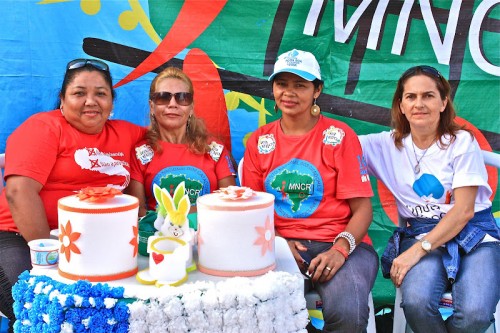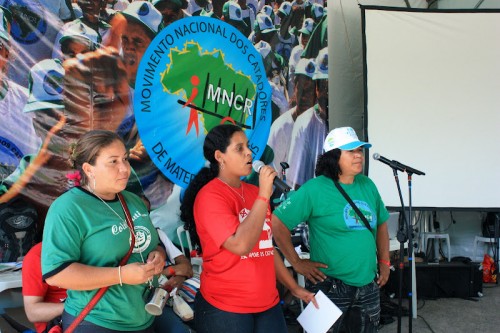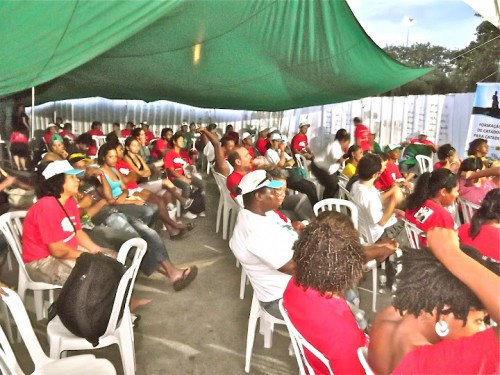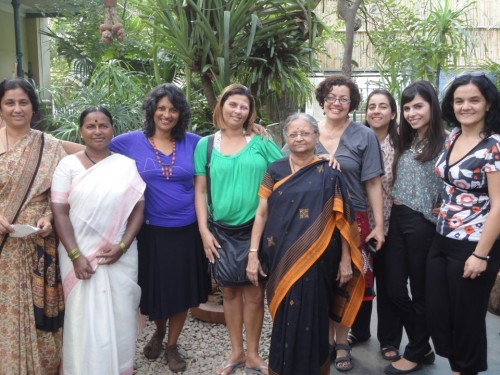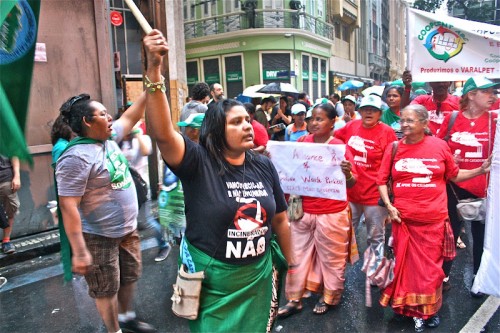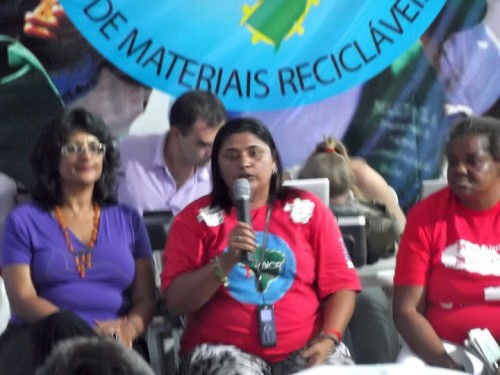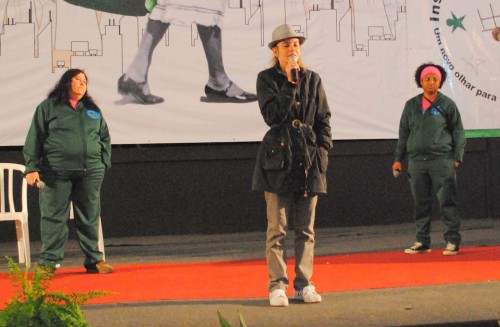When talking about capitalism, the privatizing of public goods and services, and the global economic crisis, it’s impossible not to talk about patriarchy: the system of social organization in which men hold more power than women. And when talking about transforming society into one that is free of all forms of inequality, women need to be included in the discussion and the process. More than ever, actual change is dependent on women’s empowerment and involvement.
Critics can complain about the inequalities caused by the current global economic system, but the real challenge is to apply equal rights and social justice to our own social movements. It’s within spaces like the People’s Summit —where social movements are coming up with sustainable economic and social models —that women need to be strong and present leaders.
The role of women in the creation of a just global society proposed by the People’s Summit was explained in the final declaration of the Summit, published on June 19.
“We demand a just transition that includes the expansion of the concept of work, the recognition of women’s work, and a balance between production and reproduction so that the latter is not considered the exclusive domain of women. This transition must also include the right to organize and to collective bargaining; as well as the establishment of a broad safety net of social security and protection —understood as a human right —in addition to public policies that guarantee access to decent work.”
“We claim feminism as a means to achieve equality, women’s autonomy over their own bodies and sexuality, and the right to a life free from violence. We likewise reaffirm the urgency of a fairer distribution of wealth and income; the fight against racism and ethnocide; the guarantee of the right to land and territory; the right to cities; and the rights to the environment, water, education and culture; along with the freedom of expression and the democratization of the media.”
The women waste pickers of the National Movement of Waste Pickers of Brazil (Movimento Nacional dos Catadores de Materiais Recicláveis—MNCR) actively participated in panels organized by the National Movement —where more than 500 waste pickers and allies were in attendance throughout the week—as well as at Summit-wide assemblies where the final collective proposals were being discussed.
“The issue of women’s empowerment is gaining more and more attention. People know of the role women play in large social movements,” said Sonia Dias, a specialist with WIEGO (Women in Informal Employment Globalizing and Organizing) and a visiting professor at NEPEM/UFMG (Núcleo de Estudos da Mulher da Universidade Federal de Minas Gerais) in Belo Horizonte, Brazil. In May, Dias organized a focus group with 17 women waste pickers from different cooperatives in the state of Minas Gerais, Brazil. The purpose of the focus group was to debate ideas for the creation of a future gender program for Latin American women waste pickers.
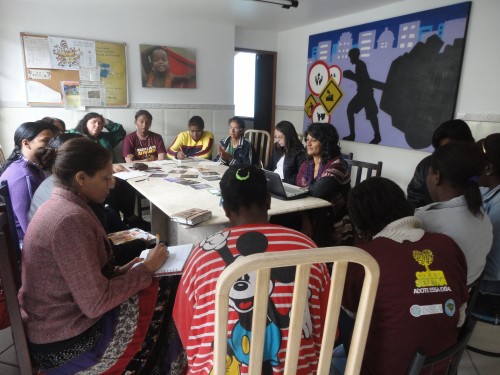
Focus group of women waste pickers in Minas Gerais, Brazil, debating the creation of a future gender program.
At the first Latin American and Caribbean Conference of Waste Pickers, held in Nicaragua in February, waste pickers with Red Lacre (the Latin American Network of Waste Pickers), aware of the role of women in the waste picking profession, expressed the importance of exploring gender issues.
Other events within the Brazilian movement have been happening for a number of years. Between July 13 and 15, 500 women waste pickers from 23 states across Brazil gathered in Pontal, Paraná state for the third National Conference of Women Waste Pickers. They debated gender equality, health, domestic violence, and public policies. The conference featured lectures, debates, and workshops, as well as cultural activities. Included in the event line-up was a march through the street of Curitiba to support gender equality and protest incineration.
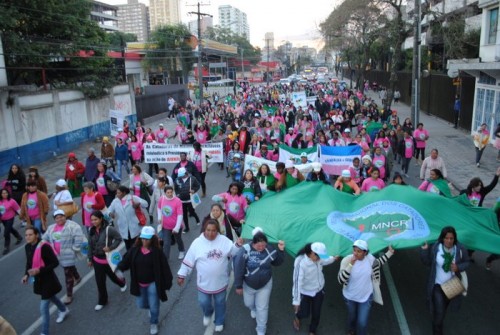
Participants of the 3rd Annual Conference of Women Waste Pickers, Brazil, march through the streets of Curitiba. (Credit: MNCR)
Women have increasingly become a focus in waste pickers’ movements around the world. At the People’s Summit during the “Gender and Work” panel—facilitated by Dias and women waste pickers—Jyoti Mhapsekar, of Stree Mukti Sangatana, spoke about the uphill battle Indian women continue to fight; in which education is often abandoned because of a need to take care of younger siblings at home and where early marriage becomes the solution for a lack of opportunity.
The Brazilian women waste pickers present at the People’s Summit were receptive to Mhapesekar’s message, discussing the importance of training women in multiple aspects: from the meaning of gender equality to learning how to operate recycling trucks.
Male waste pickers in the Brazilian movement also showed their support. Armando, the president of COOPERCATA, a cooperative in Mauá, São Paulo, expressed his support for women leaders.
“Women play an extremely important role within the movement,” he said. “First, because of their ability as leaders and because of their sensibility; their greater understanding and compassion. Women have the ability to give life. The capitalist system doesn’t care about women. And Brazil is a misogynist country—there is a lot of violence against women.”
While at the People’s Summit, Alex Cardoso, a national leader with MNCR, and Deia de Brito, communications officer with the Global Alliance, spoke with two women waste pickers with MNCR—Maria Mônica da Silva and Viviane Mertig—to discuss why it’s important to talk about gender, women’s roles, and public policies that support women. They also shared some personal stories about how they began their work as waste pickers.
Interview with Maria Mônica da Silva, waste picker/ base coordinator – National Movement of Waste Pickers – São Paulo
Alex Cardoso, waste picker/ organizer, MNCR (National Movement of Waste Pickers): What do you think of the women’s organization process?
We need training, we must be better informed, we have to understand the context of production and we really need to understand what’s going on, because sometimes we show up and begin participating without knowing what’s really going on.
Do you feel that you occupy the same space as men do? That you can just as easily take advantage of this space as men, or is it different?
I don’t think we used to. We’re gaining on it. We have more opportunity to participate now. Little by little we’re becoming empowered. If you don’t do it, you will never become empowered, so when you push us to get moving, that’s when we become more empowered.
Do you believe in the inferiority of women?
No, we’re not inferior. I think that we lack opportunity.
Deia de Brito, communications officer: When did discussions about gender begin?
Marilza Lima [with the Waste and Citizenship Institute of Paraná] was the one who got this started. The First Conference of Women Waste Pickers was in Curitiba in 2008. Marilza got in contact with fellow waste pickers. The majority of the workers within the cooperatives are women. There are black women, some lesbians. The women work at the cooperative and they work at home. Many women suffer violence in silence, without speaking out. I think we should do a survey of how many women there are – how many women are black, how many are lesbian, how many suffer abuse at home. And how many women are part of a cooperative – that are leaders but are not in positions of power. The Movement, all movements, are like this. The Movement must have the courage to open this discussion.
Do you think that men are sexist?
Many are, but the majority aren’t. In fact, it was a man, Dudú, who inspired me to become an activist. Dudú spurred me on. I remember the first time I saw Dudú and Valdilene and I asked Valdilene: “’You’re married and you travel without your husband?’ And she said: “He knows I’m a fighter’.” Dudú said, “I’m married too, and I travel. We’re strengthening the movement.” He told me, “Come and join us.” He’s authentic. He helps inspire others to become involved. He roused the movement within me. I went through a training with him in 2006 and I wanted to fight and be involved.
And what about before?
In 2005 I was working as a street picker. I joined an association called Environmental Accord in Diadema. That same year I became acquainted with the movement, and in 2006, I had my first training. When I looked at Valdilene I thought, “I want to be like this woman – a warrior who fights like hell but speaks from the heart. My eyes lit up when I saw her and Dudú.” Dudú said, “You women have to fight with us.”
Can you talk about your personal history?
I lived on the street for nearly three years. I came to São Paulo from Ceará when I was 14. I didn’t have a good relationship with my family. My mother was a single mom and at that time it was very difficult to be in that position. Today it’s considered normal. She had to work and would leave me with my grandmother. I was tossed from one relative to another. Then my mother found a husband and I went to live with her again. Her husband tried to rape me and when I tried to tell her, she didn’t believe me. I ended up on the street at 13 or 14 years old with a friend who was in the same predicament. We looked after one another. I hitched rides to São Paulo by truck. We started walking the highway on foot, but whenever we saw a truck with more than one man inside, we would find somewhere to hide. When there was only one, we would hitch a ride. The only work I knew was waste picking. Since I started as a waste picker at 9 years old in Ceará, it was all I’d ever learned to do.
A woman waste picker started inviting me to a cooperative in Diadema. The first time I came in contact with the movement was in 2005 when we went to a COOPAMARE event with Lula, the President of Brazil. The Mayor of Diadema was signing an agreement with the association that I belong to, this being the first Brazilian city to pay waste pickers as service providers. The waste pickers went up front and spoke. My whole life changed. I didn’t understand what it meant to vote conscientiously, that it was wrong to work with my kids on the street. I thought it was better to put them to work. Before getting to know the movement, I didn’t realize that the waste pickers had a voice, could fight and defend themselves.
When did you truly become a leader?
First I had to find it within me. I still hadn’t figured out if this was me. All I knew was that when I didn’t agree with something, it hit a chord, my heart would start pounding and I would just have to speak out – but I wouldn’t. I was terrified of speaking. I didn’t realize that this was the leader in me being roused.
Are women afraid to speak out?
Often women have no desire to speak out or to stand up for certain things because they’re afraid of getting burned or getting rejected, cut from certain things. I’m the most difficult person there is. When I like something, I like it, and if I don’t, I say so. If I don’t understand something, I’ll keep asking until I do, but not all women are like that. Many may not understand or agree with something, yet they don’t feel empowered enough to speak up. But this is a process.
What do women want?
I think that the women of the national movement aren’t looking for power. We don’t want power or stardom. Women simply want equality and to show that they can make a difference.
How is the work of women waste pickers different?
We see things in a different light. Women are more capable and friendlier. Women do better door-to-door collection because they speak up, are received well by people and win the confidence of homeowners and children quicker. It’s hard for men who work on waste trucks with us to understand when we have horrible cramps. This happens in the cooperatives. There are cooperatives that are only women and women understand.
Women have so much to contribute. People forget that the waste pickers’ movement was not built solely by men. Women have been an integral part of the movement.
Interview with Viviane Mertig, waste picker of recyclable materials, Environmental Agents Cooperative of Foz do Iguaçu
Deia de Brito: What is the biggest problem when it comes to gender?
Viviane: Women’s rights. Many women are beaten but keep quiet, even though they were protected by the Maria da Penha Law [a federal law in Brazil which increases punishment for domestic violence offenders]. It’s interesting that in the workshops we’ve hosted, many women opened up their hearts and shared, “I go to work and when I get home he takes all my money, leaves me with nothing. He beats me and treats me badly.” So we guide them. We say, “There’s a law to prevent these things from happening and if he does, he should be held responsible. This law exists to protect women. You have rights. If you’re working, he has to work too. You don’t have to come home and give your money to him.” This year we are planning what issues will be discussed in the workshops. Last year, there was a crafts workshop where we learned to make liquid and bar soap. This all helps to supplement family income. This is our goal.
How does supplementing family income help women?
We did a study and found that 85% of waste pickers are women and the majority of them support their family alone. With an extra income she can better support her children.
What are the most important issues for women waste pickers?
When you look at waste picker associations today, there are women who are still loading trucks by hand because they don’t have the proper equipment. We know that women don’t have the strength of a man to lift a load onto a truck. We’re trying to improve working conditions for women since they make up the majority of waste pickers. We need public policies that support women – that improve their work environment and their health. Health is a major issue. If you lift a 200 or 300 kilogram load, what does that do to your back? Or your arms? It’s a question of health in the workplace. We’re scrambling to make these improvements. For example, is there a machine that can do the job of loading a truck?
Have you made any such improvements in your own cooperative?
Whenever we acquire something, we want this available for everyone. In the cooperative, we obtained lifts for the loads. So we noticed a difference. Equipment is very important. For example, having a table for separating materials rather than separating on the ground. Many waste pickers spend all day bent over. Several women have back problems from bending their backs and lifting loads that are too heavy. Check out the dumpsites where women are lugging bags and when the trucks arrive to dump materials, they literally have to run after their livelihoods, their income. In India we saw a film about the women waste pickers there and we saw women carrying baskets of material on their heads. Do you think that doesn’t harm them? So we need public policies for women, for women’s health.
Why are there so many women waste pickers?
If you look at most of them, at least in the region where we work, the women are separated from their husbands, they are older women who came from rural areas. They worked their whole lives in the fields. As the big cities grew, they felt the pressure and came to the cities. Upon arriving, all they knew was agricultural work, so they started working with recycled materials. The job market today requires experience but it’s difficult to get people to give you that first opportunity in order for you to gain experience. At age 40, you’re already considered old and dispensable, except that you still need to eat, you need a place to live, you have bills and expenses. We need to look hard at this – first work opportunities where people can gain experience. Men in the same situation have far more opportunities. For example, the construction industry is booming, so they can work as construction workers and assistants. All we can do is work as domestic workers or in recycling.
How did you start working as a waste picker?
About 13 years ago I was desperate for a job, so I started collecting tin cans because I had a hungry, crying, young child. A child doesn’t understand, he’s in need, he’s hungry, and in your despair, you’re willing to do anything. There were days when there was no money. I couldn’t buy milk so I gave her water with sugar. The need to live made me do it. I won’t lie – I was ashamed at the time but now it’s quite the opposite. I’m aware of what I do. At that time, discrimination was rampant but we insist that the waste picker’s place is on the street so she can be seen by all.
Tweet


